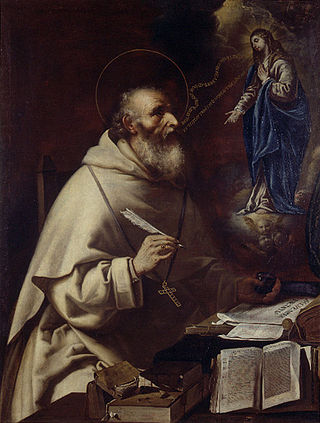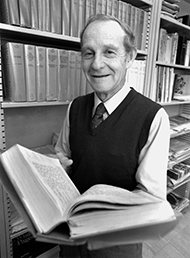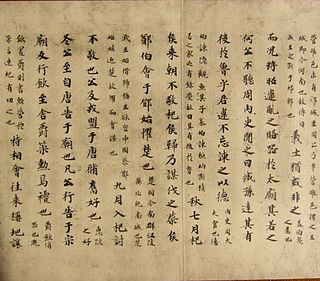Related Research Articles

Albertus Magnus, also known as Saint Albert the Great or Albert of Cologne, was a German Dominican friar, philosopher, scientist, and bishop. Later canonised as a Catholic saint, he was known during his lifetime as Doctor universalis and Doctor expertus and, late in his life, the sobriquet Magnus was appended to his name. Scholars such as James A. Weisheipl and Joachim R. Söder have referred to him as the greatest German philosopher and theologian of the Middle Ages. The Catholic Church distinguishes him as one of the 37 Doctors of the Church.

Bede, also known as Saint Bede, The Venerable Bede, and Bede the Venerable, was an English monk at the monastery of St Peter and its companion monastery of St Paul in the Kingdom of Northumbria of the Angles.

The Battle of Brunanburh was fought in 937 between Æthelstan, King of England, and an alliance of Olaf Guthfrithson, King of Dublin, Constantine II, King of Scotland, and Owain, King of Strathclyde. The battle is often cited as the point of origin for English nationalism: historians such as Michael Livingston argue that "the men who fought and died on that field forged a political map of the future that remains [in modernity], arguably making the Battle of Brunanburh one of the most significant battles in the long history not just of England, but of the whole of the British Isles."
The Perseus Digital Library, formerly known as the Perseus Project, is a free-access digital library founded by Gregory Crane in 1987 and hosted by the Department of Classical Studies of Tufts University. One of the pioneers of digital libraries, its self-proclaimed mission is to make the full record of humanity available to everyone. While originally focused on the ancient Greco-Roman world, it has since diversified and offers materials in Arabic, Germanic, English Renaissance literature, 19th century American documents and Italian poetry in Latin, and has sprouted several child projects and international cooperation. The current version, Perseus 4.0, is also known as the Perseus Hopper, and is mirrored by the University of Chicago.

Brooke Foss Westcott was an English bishop, biblical scholar and theologian, serving as Bishop of Durham from 1890 until his death. He is perhaps most known for co-editing The New Testament in the Original Greek in 1881. He was an enthusiastic supporter of the British Empire.

Christian anarchism is a Christian movement in political theology that claims anarchism is inherent in Christianity and the Gospels. It is grounded in the belief that there is only one source of authority to which Christians are ultimately answerable—the authority of God as embodied in the teachings of Jesus. It therefore rejects the idea that human governments have ultimate authority over human societies. Christian anarchists denounce the state, believing it is violent, deceitful and idolatrous.

The Four Books of Sentences is a book of theology written by Peter Lombard in the 12th century. It is a systematic compilation of theology, written around 1150; it derives its name from the sententiae or authoritative statements on biblical passages that it gathered together.
Anthony Charles Thiselton was an English Anglican priest, theologian, and academic. He wrote a number of books and articles on a range of topics in Christian theology, biblical studies, and the philosophy of religion. He served on the Human Fertilisation and Embryology Authority, appointed by the Minister of Health.
Literae humaniores, nicknamed classics, is an undergraduate course focused on classics at the University of Oxford and some other universities. The Latin name means literally "more human literature" and was in contrast to the other main field of study when the university began, i.e. res divinae, also known as theology. Lit. hum, is concerned with human learning, and lit. div. with learning treating of God. In its early days, it encompassed mathematics and natural sciences as well. It is an archetypal humanities course.
James Douglas Grant Dunn, also known as Jimmy Dunn, was a British New Testament scholar, who was for many years the Lightfoot Professor of Divinity in the Department of Theology at the University of Durham. He worked broadly within the Methodist tradition and was a member of the Church of Scotland and the Methodist Church of Great Britain during his life.

The historical-grammatical method is a modern Christian hermeneutical method that strives to discover the biblical authors' original intended meaning in the text. According to the historical-grammatical method, if based on an analysis of the grammatical style of a passage, it appears that the author intended to convey an account of events that actually happened, then the text should be taken as representing history; passages should only be interpreted symbolically, poetically, or allegorically if to the best of our understanding, that is what the writer intended to convey to the original audience. It is the primary method of interpretation for many conservative Protestant exegetes who reject the historical-critical method to various degrees, in contrast to the overwhelming reliance on historical-critical interpretation in biblical studies at the academic level.

David Noel Freedman was an American biblical scholar, author, editor, archaeologist, and, after his conversion from Judaism, a Presbyterian minister. He was one of the first Americans to work on the Dead Sea Scrolls. He is the son of the writer David Freedman. He died of a heart ailment.
An affiliated school is an educational institution that operates independently, but also has a formal collaborative agreement with another, usually larger institution that may have some level of control or influence over its academic policies, standards or programs.
Advanced Placement (AP) Latin, formerly Advanced Placement (AP) Latin: Vergil, is an examination in Latin literature offered by the College Board's Advanced Placement Program. Prior to the 2012–2013 academic year, the course focused on poetry selections from the Aeneid, written by Augustan author Publius Vergilius Maro, also known as Vergil or Virgil. However, in the 2012–2013 year, the College Board changed the content of the course to include not only poetry, but also prose. The modified course consists of both selections from Vergil and selections from Commentaries on the Gallic War, written by prose author Gaius Julius Caesar. Also included in the new curriculum is an increased focus on sight reading. The student taking the exam will not necessarily have been exposed to the specific reading passage that appears on this portion of the exam. The College Board suggests that a curriculum include practice with sight reading. The exam is administered in May and is three hours long, consisting of a one-hour multiple-choice section and a two-hour free-response section.
Timothy Peter Wiseman, who usually publishes as T. P. Wiseman and is named as Peter Wiseman in other sources, is a classical scholar and professor emeritus of the University of Exeter. He has published numerous books and articles, primarily on the literature and the social and political history of the late Roman Republic, but also the mythography of early Rome and Roman theatre.
The gospel of Luke and the Acts of the Apostles make up a two-volume work which scholars call Luke–Acts. The author is not named in either volume. According to a Church tradition, first attested by Irenaeus, he was the Luke named as a companion of Paul in three of the Pauline letters, but "a critical consensus emphasizes the countless contradictions between the account in Acts and the authentic Pauline letters." The eclipse of the traditional attribution to Luke the companion of Paul has meant that an early date for the gospel is now rarely put forward. Most scholars date the composition of the combined work to around 80–90 AD, although some others suggest 90–110, and there is textual evidence that Luke–Acts was still being substantially revised well into the 2nd century.
Hans Dieter Betz is an American scholar of the New Testament and Early Christianity at the University of Chicago. He has made influential contributions to research on Paul's Letter to the Galatians, the Sermon on the Mount and the Greco-Roman context of Early Christianity.

The Spring and Autumn Annals is an ancient Chinese chronicle that has been one of the core Chinese classics since ancient times. The Annals is the official chronicle of the State of Lu, and covers a 241-year period from 722 to 481 BC. It is the earliest surviving Chinese historical text to be arranged in annals form. Because it was traditionally regarded as having been compiled by Confucius, it was included as one of the Five Classics of Chinese literature.

Francesca Stavrakopoulou is a British biblical scholar and broadcaster. She is currently Professor of Hebrew Bible and Ancient Religion at the University of Exeter. The main focus of her research is on the Hebrew Bible, and on Israelite and Judahite history and religion.
Ford Lewis Battles was an American historian and theologian and one of the foremost scholars of John Calvin. He was an important contributor to the twentieth century renaissance of Calvin studies, bequeathing his legacy in the masterly translation of Calvin's Institutes of the Christian Religion (1960) published under the editorship of the Canadian-born scholar, Dr. John T. McNeill.
References
- ↑ "gobbet", Wiktionary, 2023-01-17, retrieved 2023-02-12
- ↑ Standen, Naomi (2009). "What is a gobbet?". HIS 1023 Encounters in World History. University of Birmingham . Retrieved April 14, 2020.
- ↑ Biggs, John; Tang, Catherine (2011). "Chapter 11". Teaching For Quality Learning At University. McGraw-Hill Education (UK). p. 244. ISBN 978-0-335-24275-7.
- ↑ Durham University, Department: Theology and Religion, Archive Module Description: 2019-20, accessed 19 June 2022
- ↑ University of Exeter, Classics and Ancient History, Gobbets, accessed 19 June 2022